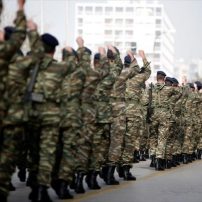
Ill treatment of a soldier from a sergeant and from another soldier because he fell asleep on duty consists degrading treatment. Inadequate investigation into same soldier’s death violates procedural aspect of right to life
JUDGMENT
Styazhkova v. Russia 14.01.2020 (no. 14791/04)
SUMMARY
The case of Styazhkova v. Russia concerned the applicant’s allegation that the official explanation of suicide for her son’s death during his military service was not
convincing.
The European Court of Human Rights held, unanimously, that there had been: no violation of Article 2 (right to life) of the European Convention on Human Rights because the
suicide explanation was not improbable and there was no evidence to prove that the authorities should have known that the applicant’s son had been suicidal and could have prevented it; but, a violation of Article 2 of the Convention as concerned the investigation into the son’s death which had not been adequate or effective, and had never considered any alternative to suicide; and, a violation of Article 3 (prohibition of inhuman or degrading treatment) because the applicant’s son had been punched and hit with a rifle by his superior and another solider for falling asleep while on sentry duty just two hours before his alleged suicide.
PROVISIONS
Article 2
Article 3
PRINCIPAL FACTS
The applicant, Lyubov Styazhkova, is a Russian national who was born in 1952 and lives in Ryazan
(the Ryazan Region, Russia).
The applicant’s son was drafted for military service in 2001. He was based in a village, Borzoy, in the
Chechen Republic from July 2002. He was found dead on 8 August 2002 in an entrenchment of his
military base, with two gunshot wounds to his right temple and bruising on his body.
The military prosecutor’s office immediately began an investigation, with a prosecutor carrying out
an inspection of the body and the scene of the incident, and ordering a ballistics test and autopsy.
He also questioned the Borzoy unit’s personnel, and one of the applicant’s son’s superiors,
Sergeant K., as well as another soldier, Private S., admitted that on the night of his death they had
caught him sleeping on duty and had beaten him.
The authorities refused to bring criminal proceedings concerning the beatings in respect of
Sergeant K., but Private S. was eventually prosecuted in October 2002 for incitement to suicide and a
breach of the rules on relations between servicemen of equal rank. The criminal case against the
private was, however, discontinued in August 2003 under an amnesty.
THE DECISION OF THE COURT…
Article 2 (right to life)
Although the investigation into the death of the applicant’s son was open to criticism, the Court
could not reject the conclusion of suicide as entirely improbable.
Nor, given the evidence, could it find that the authorities had known or should have known that
there had been a risk of the applicant’s son committing suicide and had not done everything possible
to avoid it. There was no indication that the applicant’s son had been suicidal, either because of
mental troubles before his being drafted into the army or because he had been subjected to hazing
afterwards.
The Court could not therefore find that the State had failed to comply with its duty to protect the
right to life of the applicant’s son and there had been no violation of Article 2 of the Convention in
that regard.
The authorities had, on the other hand, failed to carry out an adequate and effective investigation
into the circumstances of the son’s death. Although prompt, having lasted just over one year, and
carried out by military prosecutors who could be considered independent because they were not
connected hierarchically or institutionally to Private Styazhkov’s military unit, the investigation had
not at any point considered any alternative to suicide.
Thus, no reconstruction of events had been attempted, no gun residue or fingertip examination
carried out and 21 cartridges found next to his body had inexplicably not been provided to the
ballistics expert.
Furthermore, even though Sergeant K. had been Private Styazhkov’s superior, and he had been the
one who had hit the private first when discovering him sleeping on duty, he had been excluded from
the scope of the investigation after just two days. The Court considered that the authorities should
have thoroughly investigated Sergeant K.’s role in the incident, instead of only focusing its attention
on Private S.’s actions.
The authorities had, moreover, not shown diligence in examining Private S.’s case. There had been
four hearings planned on the case in 2003, but none had apparently taken place because either S. or
the prosecution had been missing. Indeed, that situation could give the impression that the
authorities had been deliberately avoiding starting the criminal trial until the Amnesty Act had been
adopted.
In any event, the Court reiterated that granting an amnesty or a pardon to a State agent charged
with a crime involving ill-treatment or danger to life should not be permissible.
There had accordingly been a violation of Article 2 in respect of the investigation. Given that finding,
the Court held that there was no need to examine the complaint about an ineffective investigation
under Articles 3 and 13 of the Convention.
Article 3 (prohibition of inhuman or degrading treatment)
The Government had acknowledged that the applicant’s son had been ill-treated. In particular, he
had been punished for falling asleep while on sentry duty by being punched and hit with a rifle on his
chest, face and legs. That punishment had to have caused him intense physical pain and humiliation
which had exceeded the level of unavoidable hardship of military discipline.
The Court therefore found that the applicant’s son had been subjected to ill-treatment, in breach of
Article 3 of the Convention.
Just satisfaction (Article 41)
The Court held that Russia was to pay the applicant 33,800 euros (EUR) in respect of non-pecuniary
damage and EUR 2,620.50 in respect of costs and expenses.


